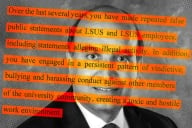You have /5 articles left.
Sign up for a free account or log in.
David M. Dooley, president of the University of Rhode Island, has issued a second statement about Erik Loomis, a faculty member at the institution whose comments about the National Rifle Association have angered many of the group's supporters.
Many academics criticized Dooley's first statement as siding with Loomis's critics, failing to see that Loomis was engaged in rhetoric, and failing to assert a professor's right to make controversial remarks. The second statement -- unlike the first -- specifically states that Loomis has First Amendment rights to share his views.
The controversy started with a Twitter post by Loomis after the murders at the Newtown, Conn. elementary school. "I was heartbroken in the first 20 mass murders. Now I want Wayne LaPierre’s head on a stick," wrote Loomis, an assistant professor of history at the university. LaPierre is CEO of the National Rifle Association. (The tweet was days before LaPierre's press conference in which he proposed armed guards in all schools.)
Many bloggers on the right immediately started attacking Loomis, arguing that he was inciting violence and that he was calling for LaPierre's murder. Loomis (and many others) responded that he had been using a metaphor, and that he wasn't calling for any violence against anyone. Amid this debate, Dooley issued this statement (here in its entirety): "The University of Rhode Island does not condone acts or threats of violence. These remarks do not reflect the views of the institution and Erik Loomis does not speak on behalf of the university. The university is committed to fostering a safe, inclusive and equitable culture that aspires to promote positive change."
The president's statement angered many academics -- at the university and beyond -- who said that it implied Loomis in fact was advocating violence and for failing to defend the right of Loomis to criticize a public figure. The blog Crooked Timber organized an open letter supporting Loomis and criticizing the Dooley statement, and more than 1,000 academics signed on.
Now Dooley has issued a new statement, which does explicitly note that Loomis has First Amendment rights, and says that the first statement was needed because Loomis had not noted that he was speaking only for himself, not the university. Here's that statement in full:
"Over the past several days we have heard from many individuals concerning statements made or repeated by Professor Erik Loomis. Many writers forcefully expressed serious concern about his statements and many others expressed very strong support for Professor Loomis, especially in regard to his First Amendment right to share his personal opinions. In the statements at issue, Professor Loomis did not make it clear that he was speaking solely as an individual, and that the views he expressed were his alone and did not reflect the views of the University of Rhode Island. This was the rationale for our original statement. The University of Rhode Island strongly believes that Constitutionally protected rights to free expression are the foundation of American democracy, and central to our mission of imparting knowledge and promoting the exchange of ideas. It is our conviction that Professor Loomis's personal remarks, however intemperate and inflammatory they may be, are protected by the First Amendment, as are the views of those who have contacted us in recent days."
Louis J. Kirschenbaum, a professor of chemistry at the university and president of its chapter of the American Association of University Professors, said via e-mail that faculty members "are happy that the president understands the reaction to his earlier statement and has acknowledged Professor Loomis' First Amendment rights."








